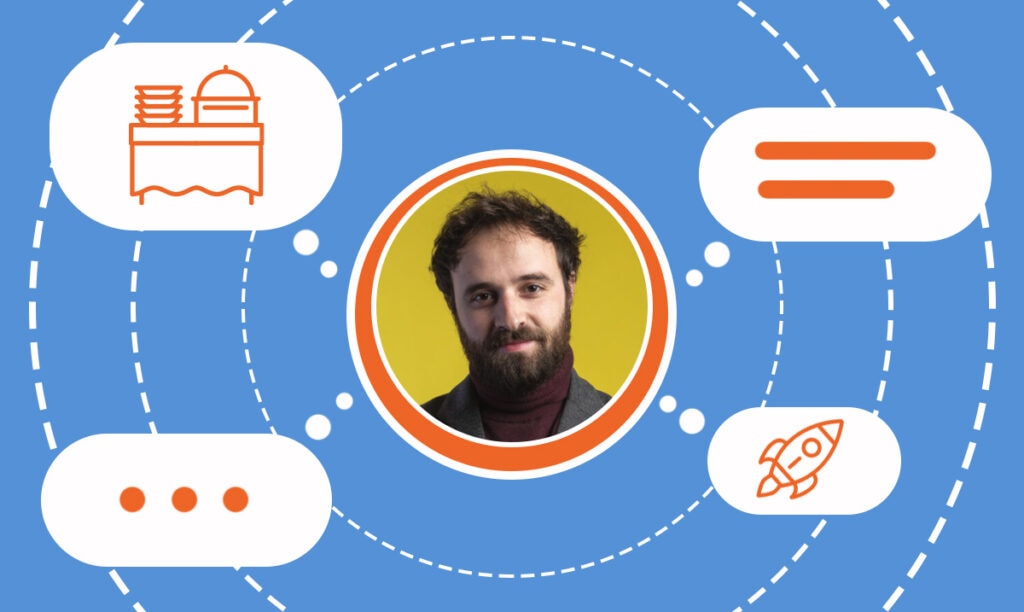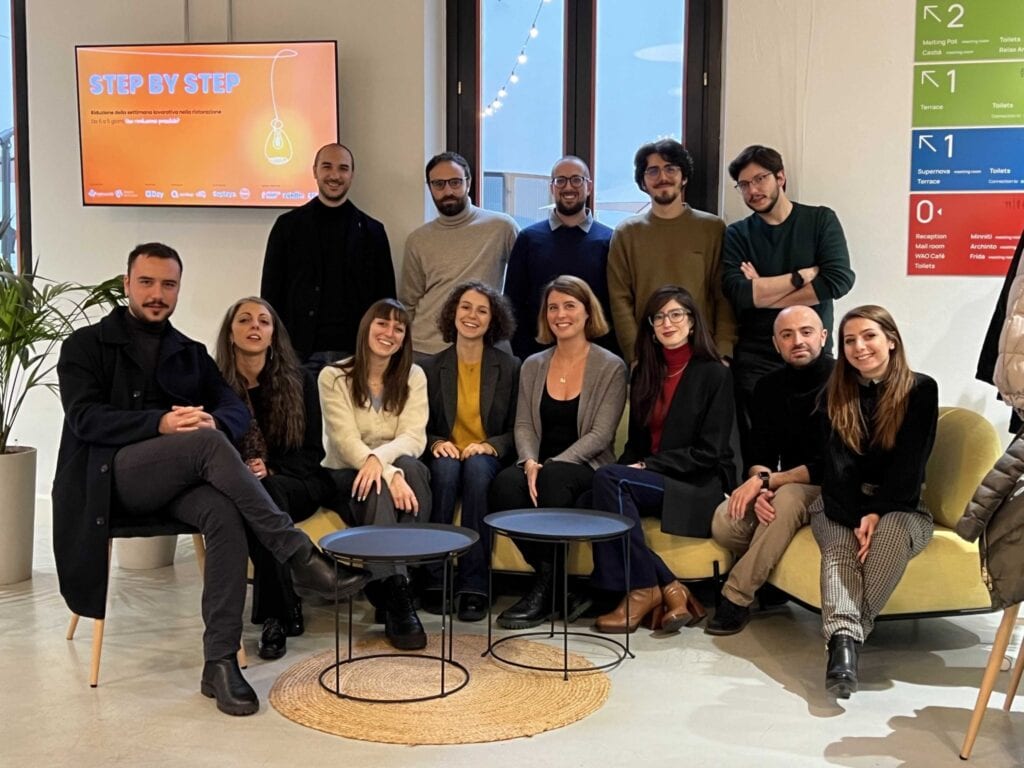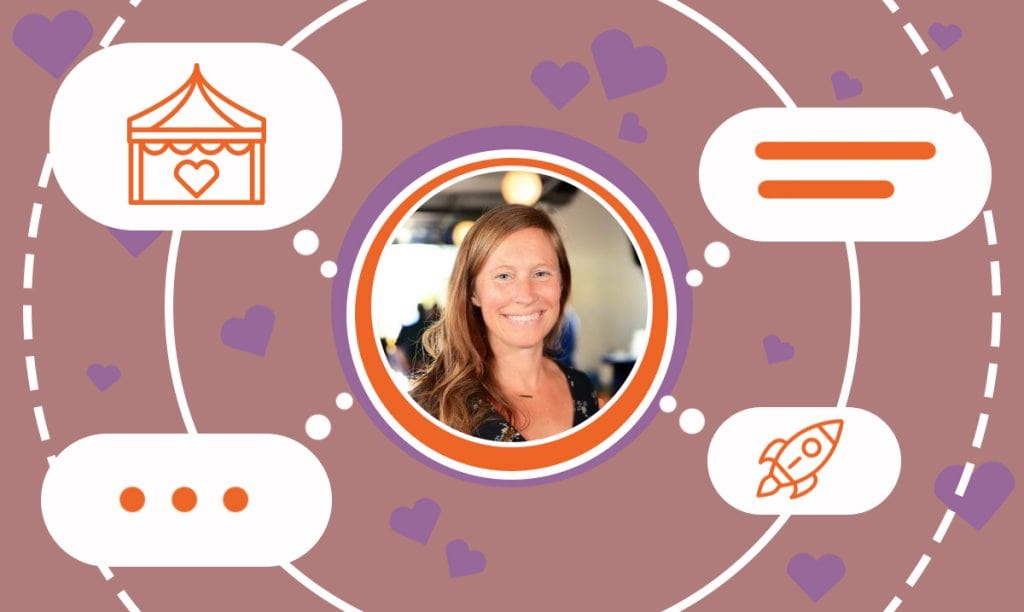Allenia Marcelle, the visionary wedding and event planner behind A & J Luxury Event Planning and its branches — Brooklyn Silk Blooms floralren ...
Luca Lotterio on Making Ho.Re.Ca Hiring Efficient and Affordable
Written by: Esther Strauss
Esther is a business strategist with over 20 years of experience as an entrepreneur, executive, educator, and management advisor.
Published on January 12, 2024

In this interview, we sit down with Luca Lotterio, the CEO and co-founder of Restworld, a pioneering start-up that has redefined the landscape of the hospitality and catering (Ho.Re.Ca) sector since its inception in 2020. Based in Turin, Italy, Restworld is a testament to Lotterio’s visionary approach, blending advanced technology with a deep understanding of the industry’s needs. Under his leadership, the company has developed a unique platform that skillfully matches job seekers with employers, leveraging artificial intelligence to streamline the recruitment process in this dynamic field.
Let’s dive into Lotterio’s journey from the initial concept to the thriving enterprise!
Origin and Inspiration
SBS – What motivated you to start Restworld, and what gap in the Ho.Re.Ca sector were you aiming to fill?
Luca – I was studying HR at the university, actually the psychology of work (less business, more human-oriented). Meanwhile, as I was paying my rent and covering my daily expenses, I used to work in restaurants during the summer and through Erasmus (I did two different programs, Tenerife and Timisoara) during the winter.
I worked in more than 30 restaurants during the years. While I was studying how to make great teams in companies (my university), I was observing the subculture of an entrepreneurial attitude in restaurants that undervalued the employees, with considerable damage through the years to the attractiveness of hospitality work. Today, one of the main reasons why “nobody wants to work in restaurants” is because there’s been a massive lack of interest in creating value and attractiveness around the hospitality roles such as waiters and chefs (well, they still survived with some TV shows), etc.
At the beginning of our startup (we started in 2020), we were complete newbies in business, startups, financial, fundraising, marketing, and all the valuable knowledge needed to start and run a startup. Luckily, we took the decision to spend two years studying, attending challenges and hackathons, and listening to speakers, podcasts, and interviews of people who were skyrocketing with their startups.
We understood the DOs and DON’Ts of creating a startup. We met two other people (our actual co-founders) coming from the engineering world, and in 2020, we opened the Restworld company with the mission of helping thousands of people find the coolest jobs in hospitality while helping human-focused companies in hospitality find amazing colleagues to work with.
So we started working, two weeks before the COVID pandemic… But here we are!
Business Model
SBS – How does Restworld’s business model work, and how do you ensure it’s sustainable and profitable?
Luca – We have a RaaS (Recruiting as a Service) model. It is similar to SaaS (subscription, recurring, MRR logic, etc.), but it has low percentage margins.
The recruiting as a service model has two fixed costs per revenue — the applicants’ acquisition cost (the workers applying to the job positions of your customers) and the cost for the customer success manager (the person who will take care of the delivery of the service to the customer).
It is a highly personalized and human capital-intensive service. Still, it gives the customers the possibility to constantly interact with an actual human, to go over the rigidity of software, and to be supported by a person as it is an extension of their internal team.
On the other side, the innovation behind this service is a continuous process optimization of the delivery, both for applicant acquisition and customer success manager tasks. By doing that, we continually reduce our fixed cost per job position managed and increase the marginality per single customer.
Today, the service itself is already profitable, but we’re still running to scale service, technology, and sales, so we’re still wasting more than we’re gaining. But it’s a written journey that will reach a breakeven one day. Amazon took 18 years to break even!
Technology Integration
SBS – Could you explain the role of AI and other technologies in your service, especially regarding the matching algorithm?
Luca – Love this question! Imagine recruiting as a step-by-step process with 36 different steps. Every step requires actions, tasks, and decisions to move forward to the next step with candidates until one is hired for a determined job position.
The steps to give you an example should be writing a job posting, collecting information from a CV, and querying the database to find the perfect matching candidate.
In every one of these steps, there are different automation processes that should take place to reduce the working effort of my customer success management team and deliver the same quality service through software. Is it easy? No! But can the AI help in this? Absolutely.
We are going back to the examples. We used to collect 55 variables when onboarding a new customer, understanding what they’re looking for as the next hire. Then we send these variables to an LLM system, prompting to create the perfect job description ready to be sent to dozens of job boards (and with SEO optimization). This should take from minutes to half an hour to be done by a single person. Imagine it for hundreds or thousands of new job positions per month.
Another step is the CV parsing. If you have a CV, you have nothing besides a PDF with something inside. But, if you can automatically parse the info inside a CV, you’ll have a dataset of information around a single candidate that can be filtered, manipulated, or queried in the database. Imagine extracting this information from 10,000 candidates every month manually…
Last but not least, with more than 100,000 registered workers in Italy on our platform today, we anticipate a significant efficiency boost and a potential 5X improvement in candidate matching, using collaborative filtering algorithms and vector capabilities inspired by tech giants like Netflix and Amazon.
So there’s not just one AI. There’s process optimization in different steps that AI can enhance. This is it 😉
Target Audience
SBS – Who are your primary users, and how do you tailor your services to meet their specific needs in the Ho.Re.Ca sector?
Luca – We have two users: people looking for their next job (B2C) and their next employers (B2B).
From the B2C side, we offer a map of Italy (soon of the entire world) with an easy UI to navigate through different job opportunities, full of details such as contract info, company info, mood info, etc., having the possibility to apply with one click and monitoring the entire situation of their applications. Meanwhile, people can make money by suggesting the job positions available on our map to other colleagues.
From the B2B side, we spent three years creating a tailored recruiting service for the restaurant and hospitality industry. It is an easy-to-use experience, with the shortest onboarding and delivery time that can be counted in days, not weeks. The technology behind it is enormous, but the perception for the customers is to have a couple of phone calls and receive suitable candidates. The goal is to not require them to be experts, to be technologically advanced, or to spend their time. The goal is, as the book said, not to make them spend time thinking but to let them obtain their goals.
Growth Strategy
SBS – Since your launch in 2020, how have you managed growth and scalability?
Luca – Huge question. I’ll try to be short. From both sides, B2B and B2C, logic is always the same: It’s a funnel question.
Growth is the ability to define a proper funnel and understand numbers and the “Why” behind the conversions. Scalability is the ability to make it replicable, to create processes that, even if you’re doubling the number of users, your operations remain the same.
To do this, you sometimes need a lot of software. To give you an idea, we have an internal platform for the customer success manager that is 100% of our property, but in the meantime, the team uses 14 different SaaSs in our company as well (from Slack to Hubspot, Calendly to Jira, and Intercom to Notion). And the data migration between software is everything.
The best investment you can make while affording scalability and growth is to collect, map, and visualize data through business intelligence. There, inside of dashboards and graphs, there are better answers to your questions. They are the best input for ideas and creativity that skyrocket your company.

Challenges and Solutions
SBS – What have been the biggest challenges you’ve faced, and how have you overcome them?
Luca – We had three main challenges during these first years.
The lack of money: If you’re running out of cash, you’re running out of everything. If you’re not paying your people, you’re losing them. If you don’t pay your stakeholders, you’ll have low-quality services. If you’re not investing, you’re not evolving. Don’t find yourself without cash, as it can go from sunny days to nightmares in a second, and bouncing back from it really worsens your mental health. How did we survive? We met with business angel investors, and they gave us a chance.
The lack of product-market fit: Never be 100% sure of your business model. It’s always a trial and error during the early stage of your business model. You can believe you have found the right product-market fit, but you then triple your revenues and customers and get destroyed by operations or lack of sustainability for your business model. Growing the business with a wrong business model, we achieved a point in which the people we hired were redundant, and we had to fire seven of 18 people. Not an incredible journey in that period.
The lack of different channels: Imagine having 100 customers looking for people to hire who are waiting for you to receive applicants. Every day you receive around 500 applicants and can send the shortlisted candidates to all your customers. One day you wake up, and your stakeholder (a job board) that was sending you the 80% of candidates decided to stop you because it’s afraid that you should potentially be a competitor tomorrow. Imagine 80/100 customers are unhappy with your service and asking for a refund. It’s a disaster. How can you avoid this? Never be dependent on a single source, and never be dependent on a single acquisition channel.
Unique Value Proposition
SBS – What sets Restworld apart from other job-matching platforms in the Ho.Re.Ca sector?
Luca – We’re also a job-matching platform. We’re a staffing agency. We’re a recruiting consultancy firm. We are three entities in the same body and in the same service.
We are a talent acquisition business partner for Ho.Re.Ca, vertical in the sector, speaking the same language, profoundly understanding their sector, and leveraging the recruiting with Italy’s biggest community of cooks, waiters, barmen, and bar ladies.
Customer Engagement
SBS – How do you maintain engagement and satisfaction among both job seekers and employers using your platform?
Luca – That’s another never-ending story, constantly evolving.
Satisfaction is delivered from expectations. What are the expectations that you’re installing into the minds of your customers when selling to them? Are you able to provide that kind of expectation? Not always, but if it’s in most cases (that is more than 90% in our cases), and you’re scaling, it is already more than reasonable.
Engagement is not spamming your users. Engaging your users must mean letting them feel that there’s something interesting, valuable, and satisfying by continuing to receive your newsletters and pop-up notifications and speak well about your company with friends and families.
Always take a look at your customers’ NPS. It is vital to understand if you’re doing well.
If you don’t have it, make an appointment with the rest of your team and, first, understand what it is; second, understand where to ask for it; and third, activate it. It is essential.
Feedback and Improvement
SBS – How do you incorporate user feedback into the continuous improvement of your services?
Luca – We have multiple touchpoints with our customers. From the beginning of our customers’ onboarding, we understand how they’re feeling with simple feedback emails, then after 15 days to understand if everything is working fine. We also ask for feedback when concluding the service and even after 30 days off. Then, having the customer success managers, we collect unstructured feedback all the way through and report to our head of CSM. She manages the input and maps it. Then feedback becomes tasks, improvements, and ideas to deliver a better experience.
Market Trends and Adaptation
SBS – How does Restworld stay ahead of changing trends and demands in the Ho.Re.Ca sector?
Luca – We’re not staying ahead. We surf the trends and demands. We always have an internal observatory on what’s next: the trends and the mutation of a solid, constantly changing industry.
We are subscribed to the top newsletters of the sector, we attend the “future talks” events of the industry, and we observe other countries. We collaborate with other startups in the industry; sometimes, we work with incubators to keep an eye on what’s popping up as new companies.
Community and Social Impact
SBS – Can you discuss any community-oriented or social impact initiatives that Restworld is involved in?
Luca – Since 2020, we spent a lot of time creating a community-oriented environment around Restworld. We embrace the battles of low salaries in Ho.Re.Ca, undeclared work, and mental health problems such as burnout in this industry. We researched these topics with more than 15,000 people and openly shared our data and knowledge with newspapers, blogs, etc., to let the country listen to these voices.
We’re involved with the first playbook for hospitality in Italy to reduce the working hours of a sector that is still anchored to the six of seven working days here. We delivered this guide open source with other startups and scaleups in our field.
Every time we hire a new person in our company, that person gets a culture book to understand where he/she is and our mission to create better working environments in hospitality.
Our journey is still at the beginning, but we believe that we can improve this industry by enhancing people.
Future Plans
SBS – What are your future plans or goals for Restworld, and how do you plan to achieve them?
Luca – We’re fundraising for a 2M€ seed round in the first months of 2024. Then we will find another office cause we’re still in a 32mq office, but there are already 18 of us, and we have an app to book the desk (quite annoying for everyone!).
We’re also working on version 2.0 of the worker platform that we will launch in March 2024, and then this is the year in which we will finally cross 1M€ in revenues — making an x3 YoY since 2021 (50k€, 150k€, 450k€ and this year the goal is 1.35M€).
Right this weekend, we will have a retreat on a mountain to write down the next steps for achieving all our plans. I’ll let you know 😉
For the following years, the goal is to achieve 10,000 active restaurants to work with, expanding in Europe and then who knows. It will be another game!
Advice for Entrepreneurs
SBS – Finally, what advice would you give to aspiring entrepreneurs looking to start a business in the digital platform space, particularly in niche markets like Ho.Re.Ca?
Luca – First of all, cofounders are vital. I’m a believer in relationships and human interactions (I believe you understood it reading here!). Co-founders allow you to be up and down and help resurface when you’re down. Co-founders will enable you to challenge yourself continuously. Advisors and mentors are also essential, especially in domains you’re not comfortable in.
Be thirsty for knowledge in different domains. Even if marketing is not your area, understanding marketing will allow you to extract X times value from relationships with your future employees, agencies, and stakeholders in that domain.
Last, to do a startup, you need a vast self-fulfilling projection. Be confident in yourself!
Subscribe to Our Newsletter
and gain insider access to cutting-edge business insights and trends.
Featured Resources

How Allenia Marcelle Transforms Events Into Magical Experiences
Published on January 3, 2025
Read Now

Robyn Lytle on Building Chicago’s Unique Wedding Venue
Published on October 29, 2024
For this interview with Robyn Lytle, owner and event manager of The Lytle House, we explore the story behind one of Chicago’s most unique andb ...
Read Now

How Swing ATL Blends Mini Golf and Events for a Winning Experience
Published on September 23, 2024
In this interview, we sit down with Masika George, co-owner of Swing ATL, to explore the journey behind this unique mini golf course in Fairburn,GA. ...
Read Now
Comments